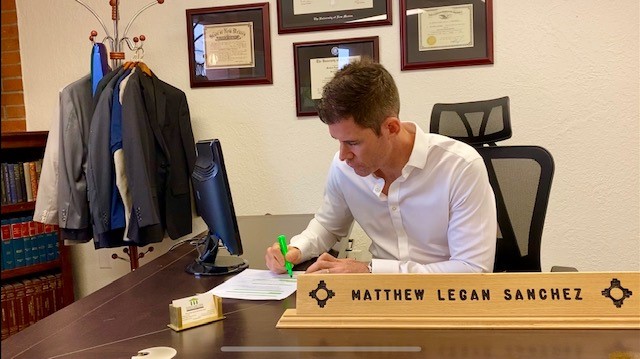
Adult Guardianship in Albuquerque, NM
How Can I Get Guardianship Over An Incapacitated Adult In Albuquerque, New Mexico?
Life has the tendency to throw unexpected curve balls in our direction. There may come a time in each of our lives when a family member, friend, or loved one becomes incapacitated and cannot care for themselves due to mental illness, dementia, disability, or substance abuse. In other situations, a child is on the brink of becoming an adult, but is unable to adequately care for themselves due to a disability such as Down syndrome.
In either of these situations, Albuquerque, New Mexico courts can appoint a guardian to provide care, child custody, and control for the incapacitated person. A New Mexico court can also appoint a conservator that makes all business and financial decisions on behalf of the incapacitated person.
The appointed guardian can be granted power to make decisions regarding an incapacitated person’s nutrition, healthcare, hygiene, safety, shelter and any other aspect that affects the individual’s well-being. In Albuquerque, New Mexico, such a guardian is appointed under the probate code to provide for the care, child custody, and control of the incapacitated person.
Guardianship can be full or limited.
Limited Adult Guardianship
- The New Mexico court limits the guardian’s power to act on behalf of the incapacitated person.
- The court can limit the guardian’s power in any way that it deems fit.
Full Adult Guardianship
- Have the same powers, rights, and duties that a parent has over a minor child.
- Full guardians do not have the financial responsibility to support the incapacitated person.
- Unlike parents, guardians are generally not liable for the incapacitated person’s actions – criminal or otherwise.
A guardian effectively steps in the shoes of an incapacitated person, making decisions on that person’s behalf.
Unfortunately, the process of becoming one’s guardian is not entirely filled with sunshine and blossoming flowers. On the darker side of the process, an incapacitated person stands to lose many of one’s fundamental rights, as well as a sense of personal dignity by being found to be incapacitated and in the process having another person named as one’s guardian. Because of these potential drawbacks, New Mexico court’s are hesitant to appoint guardianship on a whim, taking the process very seriously and strictly enforcing any legal burdens or procedures required by Albuquerque, New Mexico law.
New Mexico law and procedure requires one to satisfy a number of lengthy, expensive, and potentially stressful steps before guardianship is ultimately granted.
How To Start The Adult Guardianship Process
The process begins when a person over the age of eighteen files a Petition for the Appointment of Guardianship Over an Incapacitated Person. This Petition must state all of the requirements set forth under the Albuquerque, New Mexico Probate Code, § 45-5-303 NMSA 1978.
The Petitioner files a Request for Setting and Notice of Hearing with the Petition and Summons.
Notice of the proceedings must then be provided to the incapacitated person, the person’s spouse (if any), parents, and any adult children. If there are no adult children involved, then at least one of the person’s closest adult relatives – if any can be found – must be served with notice of the proceedings. Failure to provide adequate notice will result in the case either being continued, or dismissed.
The First Hearing with Adult Guardianship Cases
At this stage in the process the court sets an initial hearing.
At this hearing the court generally appoints a Guardian Ad Litem (“GAL”) to represent the allegedly incapacitated person, unless the incapacitated person already has an attorney acting on his/her behalf. At this hearing the court can also grant temporary guardianship to the Petitioner. This temporary guardianship only lasts 60 days, unless a motion is filed and then a subsequent order is granted by the court extending the temporary guardianship by a maximum of 30 additional days.
In addition to the GAL, the court also names a Qualified Health Care Professional to produce a Report of Health Care Professional. The court also appoints a Visitor to interview all of the relevant parties and ultimately to produce a Report of the Court Visitor.
These findings are generally reduced into an Order for Appointment of Guardian Ad Litem, Health Care Professional, Visitor and Temporary Guardianship.
At this point the relevant parties must meet with the Guardian Ad Litem, Health Care Professional, and Visitor to complete the requisite steps and reports. These reports effectively place the court on notice of the allegedly incapacitated person’s limitations. The reports also state whether or not the limitations at hand warrant the court to name a guardian on behalf of the incapacitated person.
Report of Health Care Professional
This report is generally produced by a physician that is licensed in Albuquerque, New Mexico with training and expertise regarding the assessment of functional impairment. The report includes relevant medical examination and diagnostic procedures. Based upon direct observations, medical records and reports, the physician states in the report if he/she believes that the individual lacks capacity and therefore requires the assistance of a guardian.
Report of the Court Visitor
This report is conducted by a court appointed home visitor. The report states if guardianship should be awarded based on information obtained through personal observations during in-person visits, record reviews, and telephone interviews with all of the relevant parties – and family. The report states if the Petitioner(s) are qualified, willing, able and suitable to serve as a permanent guardian.
The report may ultimately state that based on all of the information retrieved the Visitor believes that the allegedly incapacitated person would benefit from a permanent guardian, and that the Petitioner(s) are appropriate to serve in that capacity. The Visitor also interviews family members and other relevant parties to determine if they believe that the allegedly incapacitated person needs a guardian and if the Petitioner(s) are the best individuals to serve in that capacity.
The final report summarizes the individual’s physical and cognitive disabilities and assesses whether the individual is best served by a permanent guardian being appointed to manage his/her decisions regarding: placement, medical issues, and daily supervision. Finally, the report states if the Petitioner(s) are “willing, able, suitable, and qualified to serve as permanent guardians for the allegedly incapacitated individual.”
GAL Involvement with Adult Guardianship
The appointed GAL interviews the parties, family members, and any other relevant parties. The GAL reviews both reports (i.e. the Report of Health Care Professional and Visitor). Based on the totality of this information, the GAL forms an opinion about the appropriateness of naming the Petitioner as a Guardian.
Finishing the Adult Guardianship Process
The steps involved with completing the requisite evaluations and resulting reports can be time-consuming, expensive, and stressful. After these reports are completed, the Petitioner requests a Hearing to present the findings before the assigned Judge.
At this point the court sets a Hearing for Appointment of Guardianship. The Petitioner and Respondent (i.e. the incapacitated person) must be present for this Hearing. The GAL is also present and presents the findings of both reports, as well as the GAL’s ultimate recommendations.
The assigned Judge reviews the record, reports, and listens to the testimony provided in open court. Based on this information, the Judge may award guardianship.
Adult Guardianship Requirements
If the Petitioner is appointed as guardian, the guardian must report to the Court in 90 days and annually thereafter as provided by NMSA 1978, § 45-5-314 (2009). Namely, the guardian shall file an initial report with the appointed judge within 90 days of the guardian’s appointment. The guardian is then required to file an annual report within 30 days of the anniversary date of the guardian’s appointment. A copy of the report shall also be submitted to the assigned district judge. A copy should also be provided to the protected person, and conservator (if one is appointed).
(505) SANCHEZ IS HERE TO ANSWER ALL OF YOUR QUESTIONS ABOUT ADULT GUARDIANSHIP IN ALBUQUERQUE, NEW MEXICO
Do you still have questions regarding adult guardianship in Albuquerque, New Mexico? Adult guardianship cases often require the experience hand and knowledge that comes with years of courtroom practice. Matthew Legan Sanchez is an adult guardianship that has the experience to handle your Albuquerque, New Mexico guardianship case. Sanchez can be reached by calling (505) SANCHEZ.

Adult guardianship in Albuquerque







